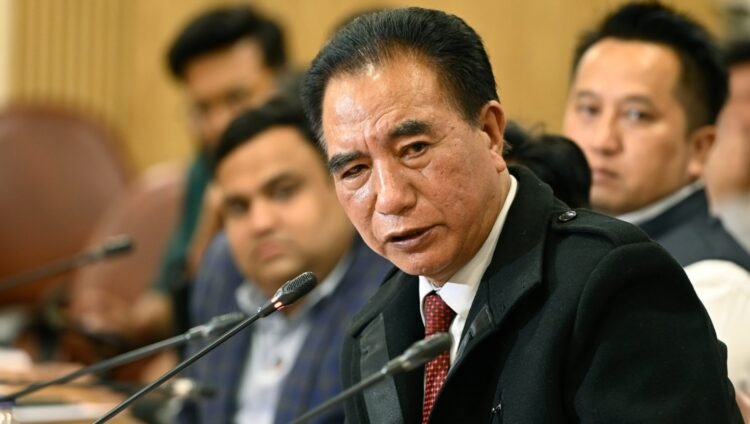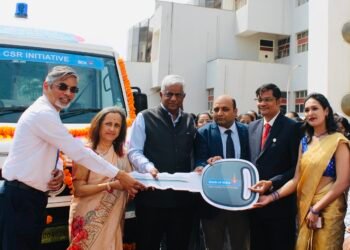NEW DELHI (India CSR): In the lush, hilly landscapes of Mizoram, a state known for its vibrant culture and recent accolade as India’s first fully literate state, a pressing challenge looms. Chief Minister Lalduhoma recently revealed a stark reality: Mizoram is among the lowest recipients of Corporate Social Responsibility (CSR) funds in India. Speaking at a workshop in Aizawl, he highlighted how the state’s potential for growth is hampered by a lack of registered agencies to channel these funds effectively. This issue, though complex, is a call to action for local organizations and a testament to Mizoram’s determination to overcome its developmental hurdles. With a dedicated CSR cell and a vision for progress, the state is poised to turn this challenge into an opportunity for growth.
The CSR Funding Gap in Mizoram
Mizoram, nestled in Northeast India, faces a significant shortfall in CSR funding, a critical resource for developmental projects. During the valedictory function of a three-day capacity-building workshop for NGOs and implementing agencies in Aizawl on June 27, 2025, Chief Minister Lalduhoma emphasized that despite numerous companies in India being legally obligated to allocate funds for CSR initiatives, Mizoram receives one of the lowest shares. According to a report, the entire Northeast region, including Mizoram, accounted for just 0.91% of India’s CSR funds in FY21, underscoring the region’s struggle to attract corporate investment.
Root Cause: Limited Registered Agencies
Lalduhoma pinpointed the primary reason for this funding gap: the limited number of registered CSR implementing agencies in Mizoram. These agencies act as conduits, enabling companies to direct their mandatory CSR contributions toward impactful projects. Without sufficient registered entities, Mizoram struggles to compete with other states that have robust networks of NGOs and organizations equipped to handle CSR funds. The Chief Minister noted that this bottleneck restricts the state’s ability to tap into the growing pool of CSR spending, which reached ₹34,909 crore across India in FY24, driven by sustainable projects in livelihood, education, and environment.
A Success Story: Serchhip District Hospital
To illustrate the potential of CSR funds, Lalduhoma highlighted the success of the Serchhip district hospital, a shining example of what effective CSR utilization can achieve. The hospital’s infrastructure was developed with over ₹21 crore in CSR contributions, showcasing how such funds can transform critical sectors like healthcare. This project stands as a beacon of hope, demonstrating that with the right mechanisms, Mizoram can leverage CSR to address pressing needs in education, healthcare, and infrastructure. The Chief Minister’s reference to this achievement serves as a rallying cry for other organizations to emulate this model.
Mizoram’s Proactive Approach: The CSR Cell
Recognizing the urgency of the situation, the Mizoram government has taken decisive steps to address the issue. A dedicated CSR cell has been established within the Chief Minister’s Office (CMO) to increase the number of registered implementing agencies and guide them in mobilizing funds effectively. This initiative, launched in collaboration with the Confederation of Indian Industry (CII), aims to streamline the process for NGOs, societies, and hospitals to register as CSR implementing agencies. Lalduhoma assured attendees at the Aizawl workshop that the CSR cell would provide ongoing support, ensuring that local organizations are well-equipped to attract and manage corporate funds.
A Call to Action for Local Organizations
During his address, Lalduhoma urged societies, NGOs, and hospitals across Mizoram to register as CSR implementing agencies. This call to action is not just a policy directive but a plea to unlock the state’s developmental potential. By increasing the number of registered agencies, Mizoram can better position itself to secure a larger share of the national CSR pool, which is projected to triple by FY35. The Chief Minister’s message resonates with the state’s broader vision of sustainable growth, particularly in light of its recent achievement as India’s first fully literate state under the ULLAS initiative, a milestone announced on May 20, 2025.
Challenges Beyond Funding
Mizoram’s struggle with CSR funding is compounded by its unique geographical and infrastructural challenges. The state’s low road density and hilly terrain make development projects logistically complex, requiring significant investment. Lalduhoma, who also chairs the High-Level Task Force on the North East Economic Corridor, has emphasized the need for infrastructure development to boost connectivity and cross-border trade. Initiatives like the Bairabi-Sairang railway line, set to be commissioned in July 2025, are expected to enhance socio-economic growth, but such projects demand substantial resources that CSR funds could help support.
Community Engagement and Future Prospects
The three-day workshop in Aizawl, organized by the Mizoram CSR Cell and CII, was a pivotal step toward building capacity among local organizations. Attended by key figures like TBC Lalvenchhunga, the Chief Minister’s adviser on finance and planning and chairman of the CSR cell, the event underscored the government’s commitment to fostering collaboration. By empowering NGOs and other entities to navigate the CSR landscape, Mizoram aims to create a sustainable ecosystem where corporate contributions drive meaningful change. Posts on X reflect growing awareness of this issue, with users highlighting the need for more agencies to tap into CSR potential.
Broader Implications for Northeast India
Mizoram’s challenge with CSR funding is part of a larger regional issue. The Northeast, despite its cultural and natural richness, often receives a disproportionately small share of corporate investments. This disparity highlights the need for targeted policies to ensure equitable distribution of CSR funds across India. Lalduhoma’s leadership in the North East Economic Corridor Task Force positions him to advocate for the region, potentially influencing national policies to prioritize underserved states like Mizoram. The success of initiatives like the Serchhip hospital could serve as a model for other Northeastern states, encouraging a regional push for CSR engagement.
Looking Ahead: A Vision for Growth
As Mizoram navigates its funding challenges, the state’s proactive measures signal a promising future. The CSR cell, combined with efforts to streamline processes and engage local organizations, reflects a strategic approach to development. Lalduhoma’s vision extends beyond immediate funding needs, aligning with broader goals like the Handholding Scheme, which has received 11,438 applications for its loan component, and infrastructure projects like the PM’s Ekta Mall. By fostering a culture of collaboration and innovation, Mizoram is laying the groundwork for sustainable growth, ensuring that its people benefit from the transformative power of CSR.
You learn
Mizoram’s journey to secure a fair share of CSR funds is a testament to its resilience and forward-thinking leadership. Chief Minister Lalduhoma’s call for more registered agencies, backed by the establishment of a dedicated CSR cell, offers a clear path forward. As the state celebrates milestones like becoming India’s first fully literate state, it stands at a crossroads, ready to harness corporate resources for a brighter future. With continued efforts, Mizoram can transform its CSR landscape, ensuring that its developmental aspirations are met with the support they deserve.
(India CSR)






















